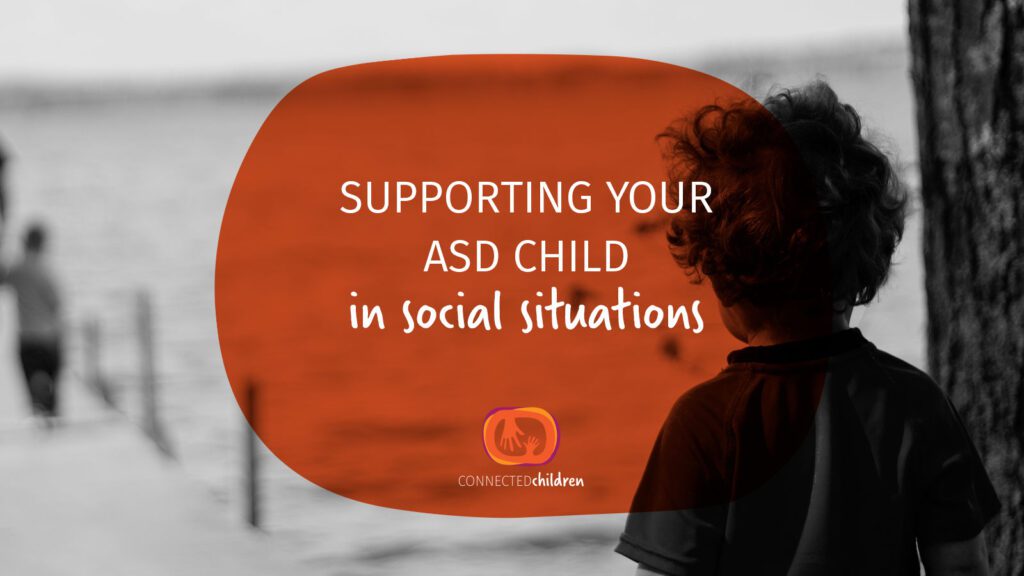
All children need a supportive community around them, but this is especially true for a child with ASD, or a child with additional support needs for social relationships. Some children may have aspects about them that impact their likeability to others. This can be extremely stressful for a parent.
When parents demonstrate empathic responses to children with ASD they help develop interpersonal skills for all children. When we model and teach empathy to kids, all children benefit. Research has shown that when children learn empathic responses they end up with a higher emotional quotient.
It is hard for any parent to see their child vulnerable. However, it is important to remember that everyone has different levels of tolerance for being able to see their child vulnerable. Some parents may be able to accept their child will be left out of social activities or struggle with play times at school. However, others may find it deeply distressing as memories may be triggered for them of their own experiences of being left out or it may trigger their fears for their child. This means that common situations in playdates may become quite stressful for the family. Some families, may choose to avoid social gatherings, this then reinforces their sense of inadequacy for their child. This can be isolating for families. Research into families with children with ASD shows that they may be more isolated than other families as they may reduce their participation with a range of aspects of community life, for example, leisure and social activities.
Families benefit from networks of support around them
A really important part of raising a child with special needs is to have a network of people, family or friends who will support you best. Who in your world can sit with your feelings of vulnerability around your child. Who in your world gets you? Who can listen to you when you are not ok? ‘Warts and all’ friends are a sacred space, they allow you to voice your fears and feel heard and understood.
Who in your world gets you?
The reality is that some parents can elicit caregiving in others and often this kindness will also be extended to their child. You may be able to think of a parent whose child pushes the boundaries and yet people tend to cut their child more slack than others. These extra compensations are offered by other parents because of the relationship they have with the special needs parent. What are the qualities in a parent that can elicit this caregiving in others? How can you elicit caregiving in those around you?
In order to have a friend you need to be one.
So how can I help my child socially? How can I facilitate social interactions for my child?
When talking with other parents about your child, you may be aware of your own feelings of inadequacy managing aspects of your child’s behaviour. Perhaps you may feel tired and worn down from your efforts supporting your child. Sometimes it may feel that other parents ‘just don’t get it’. In these situations, it is only natural that you may feel defensive of your child and your abilities to meet their needs.
If you want to change things then try something different.
Let’s think this through a little differently, what if you were to create a different space. Rather than being on the defensive (and let’s face it, sometimes you just can’t help it) try to show the other part of you, the wise, open and reflective part of yourself. Show others that you are open to these conversations with other parents. Demonstrate a willingness to share your struggles around supporting your child. This may defuse any conflict around social situations and allows other parents the chance to support you, if you have the courage to ask. I am asking you to take a chance here. This takes strength and poise, but by doing this, you are setting a powerful example to your child when dealing with challenging social situations.
This can help to build a sense of shared understanding around your child’s world.
Despite this, you may still experience those in your world who simply cannot relate to your child or to your family. They do not understand sensory processing, anxiety, ASD or other parts of your child’s needs. In that case, this is your opportunity to practice your skills as an advocate for your child.
Your child has not been mismanaged, they have not been ‘spoilt’. The reality is that sometimes your child’s world is just so overwhelming.
Despite this, in many ways, they are still like every other child as they can all get overwhelmed at times. In order to help your child, parents can support their child by developing their capacity to cope with their own vulnerabilities. This means they need to be able to tolerate when their child is not accepted or able to participate with peer groups.
It takes a village to raise a child.
Strategies to support your child:
- First you need to have clear values around how you will and you won’t allow your child to be treated. It is important, as always, to think it through. If others do not respond to your child in the way that you want them to then carefully consider your responses and the implications of your responses.
- Refine your ‘nice kids’ radar. Develop a sharp eye for children that will be able to accommodate your child’s individual needs, this will support them in social situations when they have a sensitive, empathic buddy around. These kids need to be tolerant, warm and playful.
- Arrange an unstructured play date at the park for your child and a few other classmates, you can help your child by bringing a structured activity to the playdate. This helps give your child a structure for interacting with the others. For example, you may bring a game like ping pong, or an activity where the kids can work together such as a treasure hunt. You could make biscuits with your child for them to share with others. This gives your child a sense of success within the group.
- When planning for play dates you can help develop your child’s skills for these structured games by practicing ahead of time.
- Keep it short and sweet. Help your child to feel successful in this activity by making an excuse to leave early from the play date.
- Go with the flow. Your child will have good days and they will have bad days, just like all of us. Remember you are doing a great job. Your child needs you so much more than they show you at times.
Hopefully this has been helpful for you harnessing you expertise.
